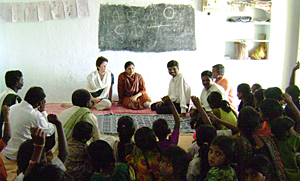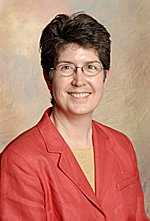

- Rozovsky wins prestigious NSF Early Career Award
- UD students meet alumni, experience 'closing bell' at NYSE
- Newark Police seek assistance in identifying suspects in robbery
- Rivlin says bipartisan budget action, stronger budget rules key to reversing debt
- Stink bugs shouldn't pose problem until late summer
- Gao to honor Placido Domingo in Washington performance
- Adopt-A-Highway project keeps Lewes road clean
- WVUD's Radiothon fundraiser runs April 1-10
- W.D. Snodgrass Symposium to honor Pulitzer winner
- New guide helps cancer patients manage symptoms
- UD in the News, March 25, 2011
- For the Record, March 25, 2011
- Public opinion expert discusses world views of U.S. in Global Agenda series
- Congressional delegation, dean laud Center for Community Research and Service program
- Center for Political Communication sets symposium on politics, entertainment
- Students work to raise funds, awareness of domestic violence
- Equestrian team wins regional championship in Western riding
- Markell, Harker stress importance of agriculture to Delaware's economy
- Carol A. Ammon MBA Case Competition winners announced
- Prof presents blood-clotting studies at Gordon Research Conference
- Sexual Assault Awareness Month events, programs announced
- Stay connected with Sea Grant, CEOE e-newsletter
- A message to UD regarding the tragedy in Japan
- More News >>
- March 31-May 14: REP stages Neil Simon's 'The Good Doctor'
- April 2: Newark plans annual 'wine and dine'
- April 5: Expert perspective on U.S. health care
- April 5: Comedian Ace Guillen to visit Scrounge
- April 6, May 4: School of Nursing sponsors research lecture series
- April 6-May 4: Confucius Institute presents Chinese Film Series on Wednesdays
- April 6: IPCC's Pachauri to discuss sustainable development in DENIN Dialogue Series
- April 7: 'WVUDstock' radiothon concert announced
- April 8: English Language Institute presents 'Arts in Translation'
- April 9: Green and Healthy Living Expo planned at The Bob
- April 9: Center for Political Communication to host Onion editor
- April 10: Alumni Easter Egg-stravaganza planned
- April 11: CDS session to focus on visual assistive technologies
- April 12: T.J. Stiles to speak at UDLA annual dinner
- April 15, 16: Annual UD push lawnmower tune-up scheduled
- April 15, 16: Master Players series presents iMusic 4, China Magpie
- April 15, 16: Delaware Symphony, UD chorus to perform Mahler work
- April 18: Former NFL Coach Bill Cowher featured in UD Speaks
- April 21-24: Sesame Street Live brings Elmo and friends to The Bob
- April 30: Save the date for Ag Day 2011 at UD
- April 30: Symposium to consider 'Frontiers at the Chemistry-Biology Interface'
- April 30-May 1: Relay for Life set at Delaware Field House
- May 4: Delaware Membrane Protein Symposium announced
- May 5: Northwestern University's Leon Keer to deliver Kerr lecture
- May 7: Women's volleyball team to host second annual Spring Fling
- Through May 3: SPPA announces speakers for 10th annual lecture series
- Through May 4: Global Agenda sees U.S. through others' eyes; World Bank president to speak
- Through May 4: 'Research on Race, Ethnicity, Culture' topic of series
- Through May 9: Black American Studies announces lecture series
- Through May 11: 'Challenges in Jewish Culture' lecture series announced
- Through May 11: Area Studies research featured in speaker series
- Through June 5: 'Andy Warhol: Behind the Camera' on view in Old College Gallery
- Through July 15: 'Bodyscapes' on view at Mechanical Hall Gallery
- More What's Happening >>
- UD calendar >>
- Middle States evaluation team on campus April 5
- Phipps named HR Liaison of the Quarter
- Senior wins iPad for participating in assessment study
- April 19: Procurement Services schedules information sessions
- UD Bookstore announces spring break hours
- HealthyU Wellness Program encourages employees to 'Step into Spring'
- April 8-29: Faculty roundtable series considers student engagement
- GRE is changing; learn more at April 15 info session
- April 30: UD Evening with Blue Rocks set for employees
- Morris Library to be open 24/7 during final exams
- More Campus FYI >>
1:41 p.m., April 3, 2009----Marsha Dickson, professor and chairperson of the University of Delaware's Department of Fashion and Apparel Studies, was recently named chair of the Fair Labor Association's (FLA) monitoring committee.
The FLA is a collaborative effort to improve working conditions in factories around the world. By working cooperatively with forward-looking companies, nongovernmental organizations (NGOs) and universities, the FLA has developed a workplace code of conduct based on International Labour Organization standards and created a practical system of monitoring, remediation and verification to achieve these standards.
Dickson has been a member of the board of directors of the FLA since 2002 and has been active in the monitoring and communications committees.
In December, Dickson traveled to Hyderabad, India, to participate in a stakeholder forum on child labor in vegetable seed production hosted by the FLA.
The FLA has been working with Syngenta Seeds, Inc. to improve working conditions on farms in India. The forum shared the results of the FLA's monitoring of farms in India against the its code of conduct for labor standards and working conditions and sought input from attendees on how best to remediate the problems found.
Attending were representatives of nongovernmental organizations and labor rights groups in India, Syngenta staff based in India and corporate headquarters in Basel, Switzerland, as well as representatives from other multinational agribusinesses - including Bayer and Monsanto -- with seed production in the area.
Syngenta approached the FLA in 2003 because of international media and activist campaigns regarding child labor in their cotton seed industry. When Syngenta made the business decision to sell its cotton seed division worldwide, the project was transitioned to vegetable seed production in the Gujarat, Maharashtra, and Karnataka states in India.
In addition to attending the one-day forum, Dickson traveled with FLA staff based in India and representatives of the M. Venkatarangaiya Foundation (MVF) to visit a rural region about 300 kilometers south of Hyderabad where cotton and vegetable seeds are grown.
The MVF actively works to eliminate child labor and to universalize opportunities for all children to receive at least an elementary education. The MVF monitors farms for child labor and then works with community officials and farmers to get the children off the farms and back into schools.
Dickson and the others visited a camp where around 20 to 25 girls ages five to 12 reside and go to school. Some had come off the farms only a few days earlier.
“The young girls expressed great pleasure about joining the camp because of the regular meals provided, unlike at home where they often encounter food shortages,” said Dickson. “They were also enjoying studying and making friends, and staying out of the heat and dust in the fields.”
Article by Beth Chajes


